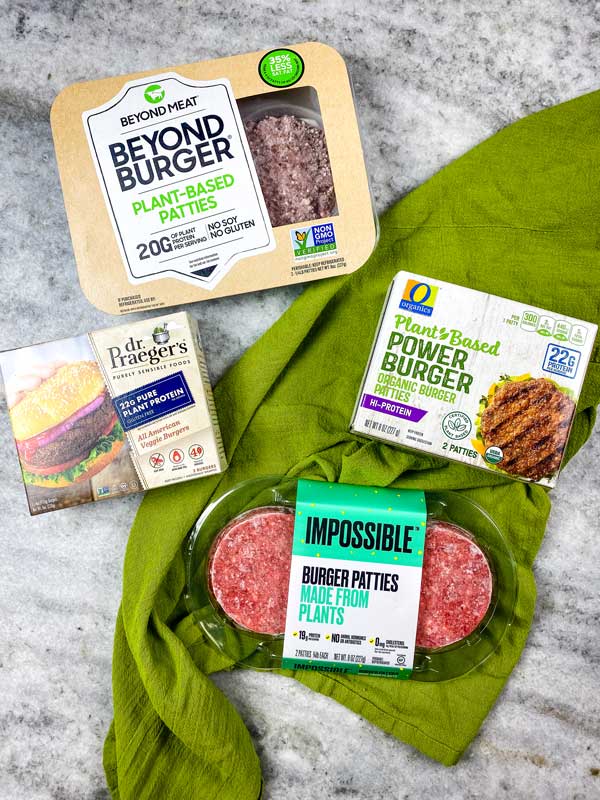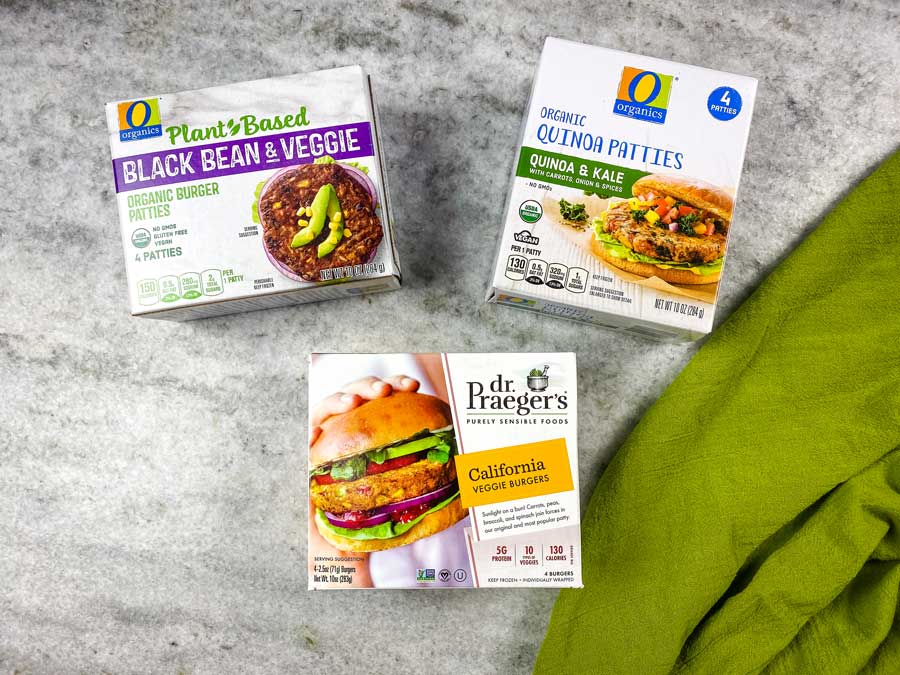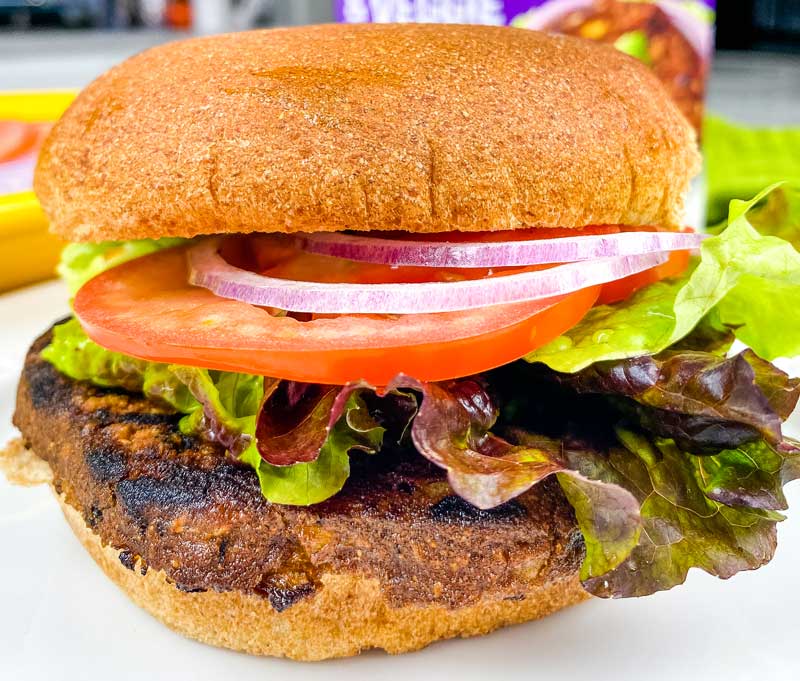Being vegan, plant based, Whole Food Plant Based, or vegetarian can all mean drastically different things. One of the biggest places that I notice this is when talking about veggie burgers.
I’m not here to tell you which burger is right for you. There are so many definitions of the word healthy, and so many reasons that someone might (or might not) want to eat a specific type of burger. I’m not here to tell you which type of burger is healthiest–that’s something for your doctor to help you with. I’d like to bring awareness to the different types of burgers and exactly what they are, as I’m learning that this is a confusing topic for many.
Key Differences To make a Plant-based burger patty, certain plant parts like starch and protein get extracted and isolated. Then, those parts get combined to make a product similar to meat. Veggie burgers simply combine things like beans with vegetables using binders.

Plant Based vs Veggie Burgers
Plant based burgers (typically made from pea proteins and lots of science-y ingredients that I can’t pronounce) are meat alternative burgers–like the Impossible Burger and Beyond Burger. They’re products that were created to be a replacement for traditional animal burgers. They have similar protein content, texture, smell, and even taste. Some of the meatless burgers taste very similar to real burgers (the Impossible Burger is the best in our opinion) and some aren’t the tastiest.
Veggie burgers are burgers made with vegetables–typically mushrooms, beans, peas, and carrots. These burgers don’t have the same protein content as traditional burgers, but they are filled with real vegetables. Veggie burgers aren’t competing with regular beef patties–nobody is going to be “tricked” into thinking that a veggie burger is a beef burger.
We invited several meat eating friends over and grilled up several types of plant based and veggie burgers–here is what we thought!
Plant Based Meat Alternatives

If you’re vegan, WFPB, vegetarian, concerned about the environment or animal consumption, this is something you might be interested in. These burgers are the ones you’re looking for if you don’t eat meat (for whatever reason) but want a traditional “burger.”
In order of preference, these are the plant based burgers that we tried:
The Impossible Burger was the clear winner–for taste, smell, texture, and ease of cooking. It tasted most like a traditional ground beef hamburger and didn’t have any smells that were off putting. If this burger sounds familiar, it’s because fast food giant Burger King uses this brand for their Impossible Whopper sandwich.
dr. Praeger’s was a good burger. We couldn’t pinpoint what the difference was between that and real meat products, but there was something small.
The Beyond Burger is another popular option, but we think these smelled a little strange when uncooked and needed to be seasoned before putting them on the grill. When we have made chili with the Beyond meat, we could taste the difference in the end product. These are the most widely available meat substitutes, we have found–Costco even has them. The texture is pretty close to regular meat, but the smell was not great.
The O Organics brand (from Albertsons stores) was our least favorite, but we all agreed that if it was the only option it wouldn’t necessarily be a bad burger. But since we had others to compare side by side, one had to come in last.
These burgers are made with vegetables. Like I mentioned above, there is no “tricking” someone into thinking that these are meat burgers–they’re not. But they have a place, for sure, and can be delicious.
We tended to like the burgers with actual chunky vegetables in them best–some are pretty blended up and had a mushy texture when cooked.

In order of preference:
We loved the Quinoa & Kale burgers from O Organics. This company has several great veggie burger options: Sweet potato and Mushroom are the other two that we liked. They’re full of chunky vegetables and feel satisfying to eat.
dr. Praeger’s Veggie burgers were delicious too! We really liked these, though they were a little mushier than the O Organics ones. They had chunks of vegetables in addition to blended vegetables to help hold them together. We really liked that they were thicker and hearty. They have a lot of different varieties in the stores too–definitely a bonus.
O Organics Black Bean & Veggie were good, but there is a definitely texture difference between a veggie burger and a black bean burger–it’s more of a blended burger with a few chunks. There had to be a last place, but honestly I would eat these again for sure.

Are Veggie Burgers actually Healthy? The Fascinating Truth!
FAQ
What is the difference between a plant burger and a veggie burger?
What is the subway plant patty?
What are plant based burger patties made of?
Are plant-based patties healthier?
Are veggie burgers the same as plant based burger?
Veggie burgers and plant-based burgers are not the same thing. Let’s look at each product closely. A veggie burger is a burger patty that is made from ingredients that are grown on plants. A veggie burger is a combination of filling base like beans, rice or soy mixed with vegetable and seasonings.
Are plant-based burgers vegan?
The majority of Plant-Based burgers are vegan friendly. My favorite veggie burger at the moment is the Vegefi burger from BurgerFi. The Vegefi burger is a crispy quinoa and veggie burger topped with your traditional burger toppings plus a delicious sauce.
What is a plant based burger?
Plant-Based burgers are made from ingredients that have been isolated and removed from plants to create a meat-like patty. Veggie burgers are made by mixing together a base of beans, rice or soy with binders, seasonings and vegetables. Other Articles You May Enjoy! Veggie burgers and plant-based burgers are not the same thing.
What are plant-based burger patties?
Plant-based burger patties can be prepared and consumed in the same way as their meat counterparts – in a bun with the consumers desired toppings! This makes them less dauting and easier to use than products that cannot directly replace meat, such as legumes or tofu.
